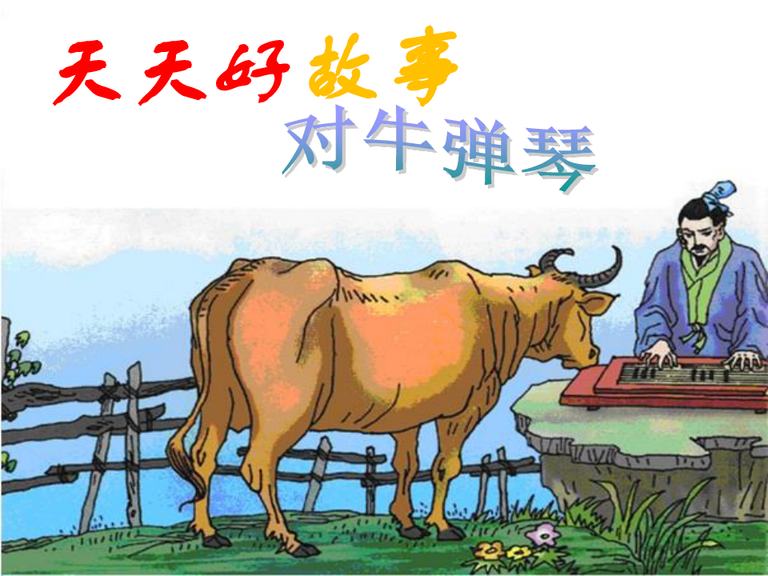
During the Spring and Autumn Period, there was a famous musician named Gong Mingyi in the state of Lu. He was skilled at playing the piano, and the sound was so beautiful and pleasant that people were fascinated by such wonderful music.
One spring, he brought his lute to the outskirts. Seeing the pleasant spring scenery and having happy mood, he couldn't help but want to play a song. Looking around, he saw a cow grazing in the field and had a sudden idea to play an elegant song for it.
He walked up to the cow and started playing seriously. Although the song was melodious and pleasant, the cow seemed unresponsive and kept bowing its head to eat grass. Gong Mingyi felt helpless when he saw that the beautiful music couldn't touch this cow, and could only sigh. Then, he came up with a way to fiddle with the strings and create a chaotic melody, like the buzzing of mosquitoes and flies, and the piercing sound of horns. As a result, the cow reacted and raised its head, looking at Gong Mingyi in fear.
Later on, people used the metaphor of "playing the lute to a cow" to describe preaching big truths to foolish people, speaking without considering their audience, and wasting energy in vain.
The story of “playing the lute to a cow” contains rich cultural values and profound inspirations. It tells us that when communicating, we should fully consider the other party's ability and interests, choose appropriate methods and content, in order to achieve the expected results. This principle applies not only to interpersonal communication, but also to multiple fields such as education, business, and politics. At the same time, this story also reminds us to respect differences and understand diversity, not to measure and demand others based on our own standards, but to learn to put ourselves in others' shoes. Only in this way can we establish more harmonious and effective communication relationships, and achieve common development and progress.
春秋时期,鲁国有个著名的音乐家叫公明仪,他善于弹琴,琴声优美动听,人们听到如此美妙的音乐如痴如醉。
有一年的春天,他带着琴来到郊外,看到春色宜人,心情愉悦,他不禁要弹琴一首。环顾四周,看到田野里有一头牛在吃草,他便突发奇想,要为这头牛弹一曲高雅的歌曲。
他走到牛跟前,认真地弹了起来,尽管歌曲悠扬,悦耳动听,可那头牛似乎毫无反应,一直低头在吃草。公明仪见美妙的音乐打动不了这头牛,很是无奈,只能一声叹息。接着,他想出了一个办法,胡乱摆弄琴弦,弄出杂乱无章的调子来,像蚊蝇的嗡嗡叫,又想刺耳的喇叭声。结果这头牛有了反应,抬起头来,似是恐惧的样子,呆呆看着公明仪。
后来,人们就用“对牛弹琴”来比喻对愚蠢的人讲大道理,说话不看对象,白白浪费力气。
“对牛弹琴”的故事背后蕴含着丰富的文化价值和深刻的启示。它告诉我们,在沟通时要充分考虑对方的接受能力和兴趣,选择恰当的方式和内容,才能达到预期的效果。这一原则不仅适用于人际交往,也适用于教育、商业、政治等多个领域。同时,这个故事也提醒我们要尊重差异、理解多样,不要用自己的标准去衡量和要求他人,而是要学会换位思考、因材施教。只有这样,我们才能建立更加和谐、有效的沟通关系,实现共同的发展和进步。